The Idea
Cal Poly’s Kennedy Library will join the global movement of hosting Wikipedia Edit-a-Thon campaigns. The goals of these events are trifold: to build foundational information-literacy skills in students, to form collaborative partnerships between campus faculty and LIS staff toward curriculum fulfillment, and to align with institutional missions of active learning and creating more equitable representation of historically underrepresented stories. At Edit-a-Thons, classes, sections, or majors of students collaborate to contribute to Wikipedia articles, whether via page creation, editing, reference addition, or image and media upload and association, targeting subjects identified as in-need or tailored to meet curriculum design(s). Consequently, the open-access information community and future researchers are assisted, while historical record is improved for the masses. Pamela Carson, a web services librarian at Montreal’s Concordia University, noted that “an academic library is the perfect setting for a Wikipedia Edit-a-Thon, mainly because it’s a great place to do research, [adding] ‘We have access to millions of scholarly articles and books which can be used as high-quality sources to support assertions made’” (Peacock, 2016). Meanwhile, as Lauro (2020) observed, “Wikipedia edit-a-thons have since become international vehicles for reconciling gaps in gender and cultural representation as educational institutions, libraries and museums work in collaboration with the online encyclopedia to increase the number of articles about notable women, and those related to women’s histories and interests” (p. 1003).
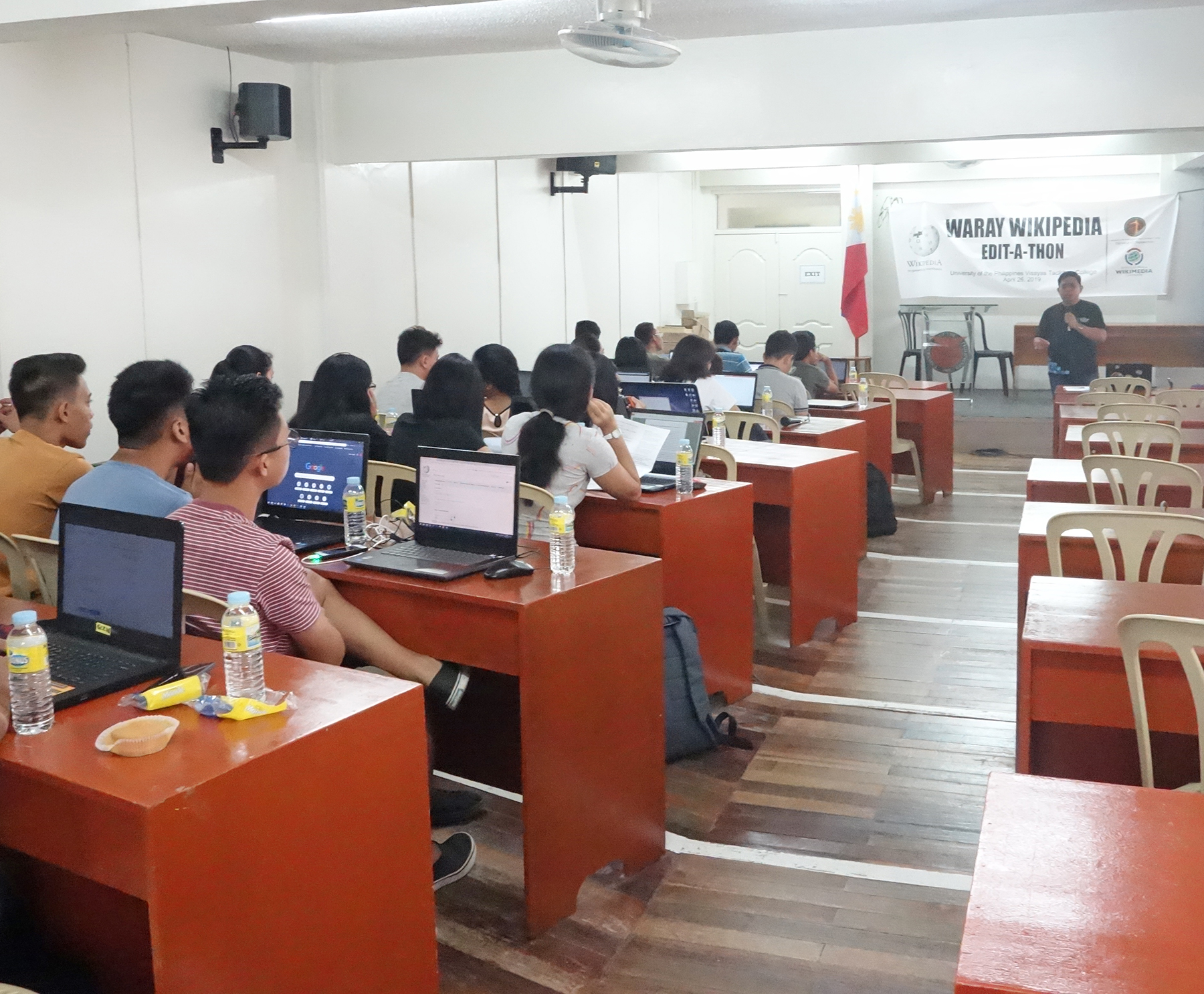
The University of the Philippines (Visayas Tacloban College’s Division of Humanities) holds a National Literature Month Wikipedia Edit-a-Thon in 2019. (Photo Courtesy of Wikimedia Commons, by ‘JinJian’)
Aligning with the Institutional Mission
Cal Poly explains its library’s mission as: “We are a Learn by Doing library. We help every member of the Cal Poly community engage in open and informed inquiry, and contribute through creation, innovation, and collaboration, to the quality of life of our community” (Robert E. Kennedy Library, 2025). Hosting Wikipedia Edit-a-Thon events is in line with the ‘Learn by Doing’ ethos, as students will be taking an active role in engaging not only with peers and faculty mentors on campus, but also with communities in the San Luis Obispo and Central Coast areas, as well as with extended research collectives across the globe. In addition, the library adheres to a diversity statement: “Through education and action, the library will disrupt the processes and structures that encourage inequity and racism and create an equitable and inclusive environment where all people feel welcome, seen, heard, and represented, especially those who are from groups that have been historically or are currently marginalized or disenfranchised because of race, ethnicity, gender, sexual orientation, disability, social class, religion, national origin, and other social and cultural identities” (Robert E. Kennedy Library, 2025). The library’s audience is primarily made up of students and faculty, although local residents and alumni also utilize its resources and are impacted by library planning, programs, and events. Guiding this project, “the overall goal of such a plan is to ensure that technology meets the mission of an organization” (Stephens, 2004). Because the library’s resources will be used in a truly learn-by-doing fashion, while engaging the community in a collaborative, creative manner designed to improve representation of historically marginalized and disenfranchised people, the Wikipedia Edit-a-Thon series indeed meets the organization’s missions.
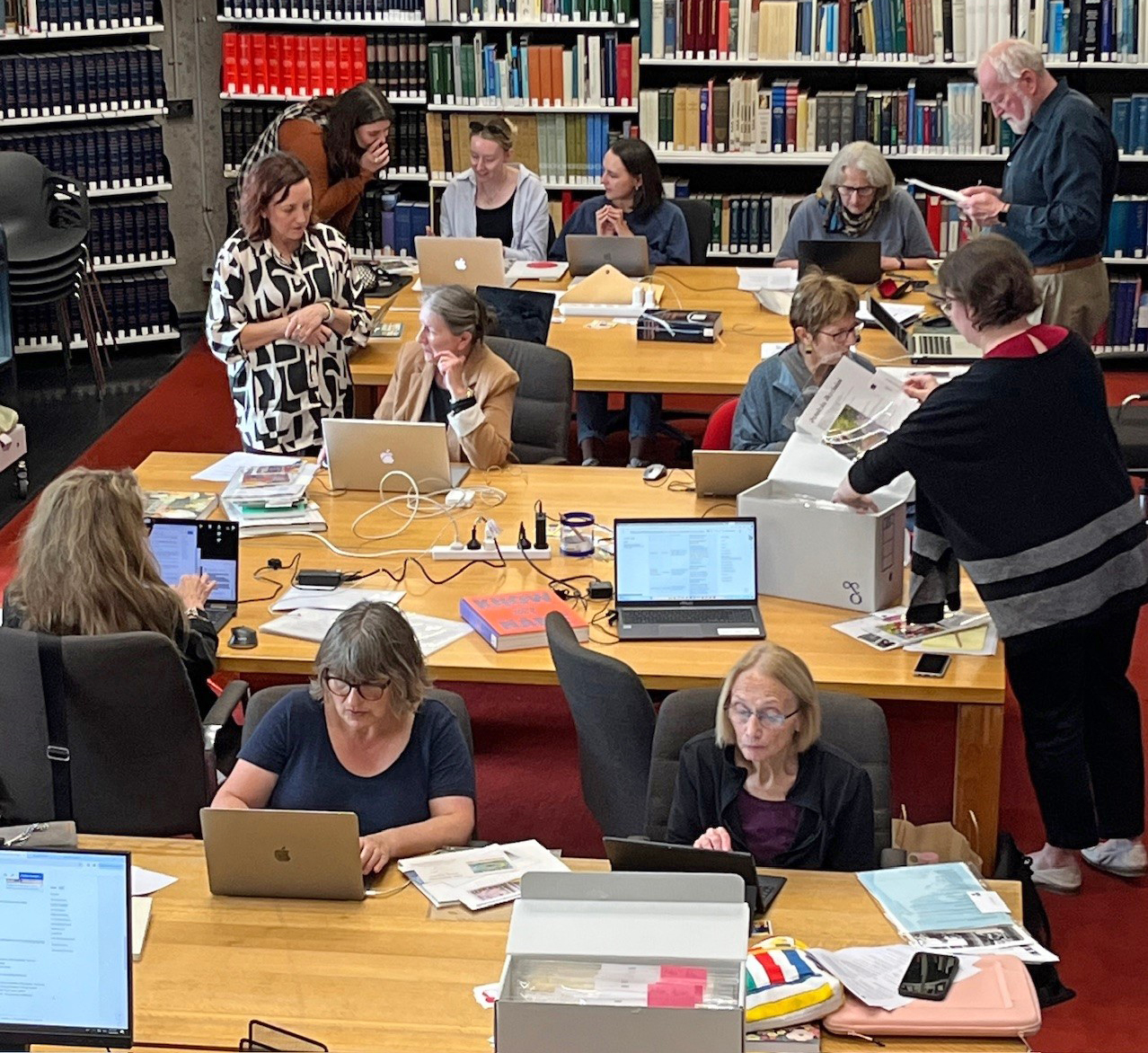
The National Gallery of Australia Research Library hosts the 2024 Know My Name Wikipedia Edit-a-Thon. (Photo Courtesy of Wikimedia Commons, by ‘AliceintheAlice’)
Action Brief
For students: By participating in quarterly Edit-a-Thons, you will build and cultivate foundational research and information-literacy skills, which will pay dividends in coursework and, ideally, career preparation, because these instilled tools and habits will translate to professional aptitude and practice.
For faculty members: By participating in events, you will align editing themes and subjects with curriculum focus and educational objectives, while empowering student skillsets, which ultimately will culminate with student success because they’ll approach coursework with improved academic tools at their disposal because of their experience through the program.
For community partners (e.g., local historical institutions or cultural organizations): By collaborating with Kennedy Library facilitators and faculty partners, you will find opportunities to improve public, open-access record and representation of identities, histories, and people, which will serve as venues for Edit-a-Thon events because of pre-existing underrepresentation on Wikipedia.
For staff members: By facilitating these events, we will fulfill the library’s missions. These dynamics will improve library popularity across campus and in the community because the participation of attendees and ensuing discussion will increase knowledge of library services and offerings, drive traffic to the library, and enhance our visibility both online and locally.
Inspiration Sources
Academic libraries which have hosted successful Wikipedia Edit-a-Thon events serving as inspiration include:
- Indiana University of Pennsylvania, where Vetter et al. (2022) found Edit-a-Thon participants to rank critical thinking, digital literacy, and online source reliability as important learning outcomes (p. 1162). IUP also noted participants effectively engaging in criticality to address Wikipedia’s gender gap, responding to the “importance of working toward equal representation” because, as of 2022, “only 17% of the bibliographic articles on the English Wikipedia represent women biographies” (p. 1155).
- The Network of the National Library of Medicine, which organized “biannual editing campaigns aimed at adding citations to reputable sources of information,” as “over 300 editors have made nearly two-thousand improvements to Wikipedia’s health pages, and nine institutions nationwide have hosted campaign-affiliated local edit-a-thons” (Cowles et al., 2020, p. 267).
- UNLV, which has assembled a thorough and useful LibGuide for institutions looking to take on this sort of project (UNLV University Libraries, 2025). UNLV University Libraries (2025) noted: “The English version of Wikipedia has also been criticized for racial bias because a very low number of those who edit articles are people of color. This lack of women and people of color editors results in articles that are potentially biased and a lack of articles that might be of interest to women and people of color. By editing Wikipedia and hosting edit-a-thons, people can help to improve representation on Wikipedia.”
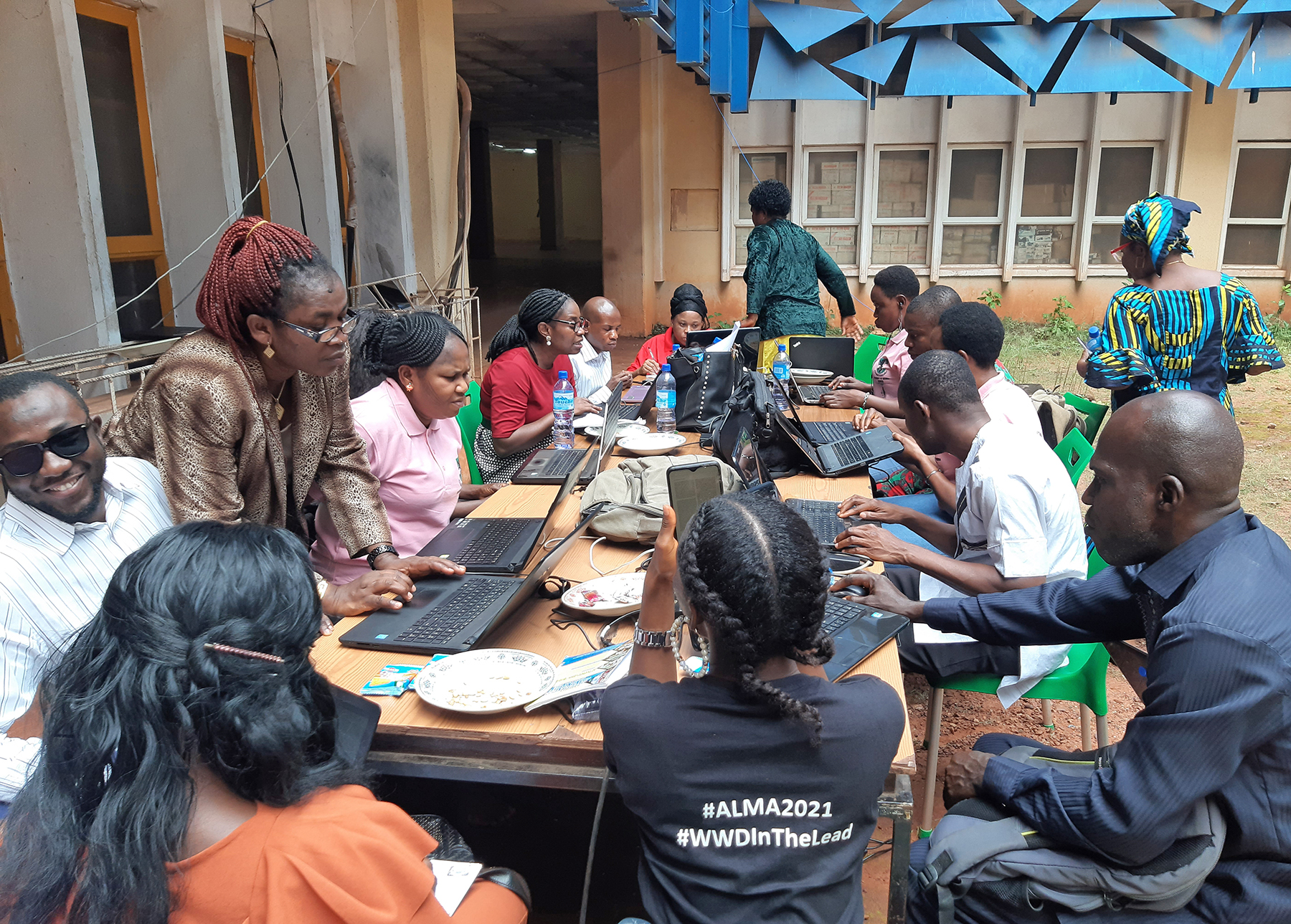
Universities Research Group of University of Nigeria Nsukka hosts a Wikipedia Edit-a-Thon workshop in 2021. (Photo Courtesy of Wikimedia Commons, by Ngozi Osadebe)
Guidelines & Policies
Each year, toward the end of the spring term, student and faculty feedback will be sought via survey forms to identify both future subject themes for events and areas for improvement within the program. Additional surveyed feedback will be collected from Kennedy Library teams by respective department heads, who will meet during the summer to review the program’s guidelines & policies while beginning to plan for upcoming events in the year ahead.
As a guiding policy, all editing events should be designed with consideration of student, faculty, and community-partner interests, with a focus on improving Wikipedia representation of underrepresented communities. Respectful communication will be a requirement of participation, and Wikipedia “vandalism” will not be tolerated.
Timeline for Implementation
Initial surveys for preliminary solicitation of themes and subjects to address will be distributed to students, faculty members, and community leaders annually in April, with feedback collected and analyzed beginning in early June. As Barbakoff and Lenstra (2024) explain, “Community-led planning is a method for making decisions that puts power in the hands of the community,” and “in community-led planning, understanding the community and its priorities comes from building ongoing relationships with the public, especially minoritized communities” (p. 34). Kennedy Library will strive to foster “a more equitable digital future” through the series (American Library Association, 2022). To this end, input on recommended themes and suggested subjects for upcoming foci of planned Edit-a-Thon events will be distributed in survey format to the following organizations:
- Cal Poly’s Native American and Indigenous Cultural Center
- Central Coast Chinese Association
- Diversity Coalition San Luis Obispo County
- The Women’s Monday Club SLO
- Race Matters SLO County
- RaiseUP SLO
- San Luis Obispo Gala Pride and Diversity Center
In addition, similar solicitation for theming and subject-focus ideas will also be distributed to the university’s PolyCultural student associations:
- alpha Kappa Delta Phi
- Black Student Union
- Chinese Student Association
- Imagen y Espiritu Ballet Folklorico
- Indian Student Association
- Iranian Student Cultural Organization
- Japanese Student Association
- Korean American Student Association
- Lambda Theta Alpha
- Lambda Theta Phi
- Latinos in Agriculture
- Latinx Business Student Association
- Latinx Cultural Association
- National Society of Black Engineers
- Nikkei Student Union
- Nu Alpha Kappa, Fraternity Inc.
- Pilipino Cultural Exchange
- SLO Breakers
- Society of Hispanic Professional Engineers
- Southwest Asian North African Club
- Thai Vietnamese Student Association
- United Movement
As Stephens (2019) advised regarding participatory fulfillment of an idea, “Are you involving your community from the get-go?” (p. 4) Hence, by surveying students, faculty, and seeking suggestions for subjects from community constituents, the library will foster participatory engagement.
The Program Librarianship team, consisting of the Foundational Learning & Engagement Librarian, the Student Success and Outcomes Librarian, and the Research Engagement and Impact Librarian, will lead the survey and feedback synthesis phases of this project. In order to carve out sufficient time for the series, each team member will submit to supervisors recommendations for tactics to “streamline [incumbent or perhaps now less in-demand] workflows and free up hours for new duties,” as Stephens (2008) found prudent for such implementation (p. 317). They will then present recommendations to the Academic Services Associate Dean, the Special Collections & Archives Director, and the Collections Strategy & Discovery Associate Dean, who will then present final recommendations for the ensuing year’s three event themes for approval to the Dean of Library Services.
A pilot program will be launched in mid-October. The pilot program will include three separate two-hour events for the first year, each planned to be held midway through each regular-calendar quarter: in mid-October (fall quarter), early March (winter quarter), and early May (spring quarter). [Note: Cal Poly is projected to switch to a semester format in the fall of 2026. At that time, the anticipated event plan will shift to early October (for fall semester), mid-March (spring), and late July (summer).] The schedule in years ahead may be adjusted depending on feedback received from the pilot endeavor.
To start, the Program Librarianship team will prepare a LibGuide (similar to that of UNLV) with tutorials and resources for editing, creating, and uploading to Wikipedia, aimed to be completed by late September. Interested participants will be provided with the LibGuide upon invitation to, and promotion of, the debut event, during the first week of October. Two open computer labs, accommodating approximately 50 people, will be reserved for the debut event.
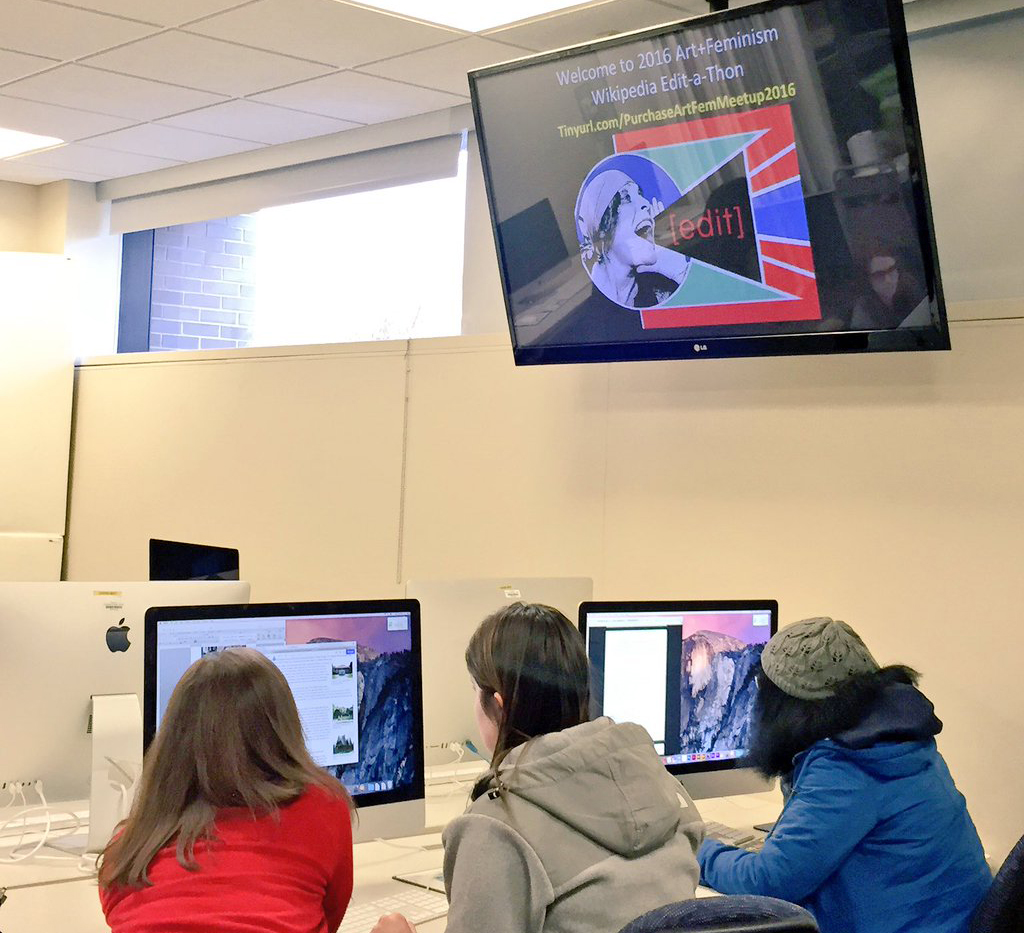
Editors contribute during an Art + Feminism-themed Wikipedia Edit-a-Thon at Purchase College (State University of New York) in 2016. (Photo Courtesy of Wikimedia Commons, by ‘AnchorsandArrows’)
Marketing and Promotion
Within the organization, a Google Drive folder will be started with an FAQ document, a project schedule, and an ideas & planning page, which will be started and maintained by the Program Librarianship department, and then distributed with links in a staff-wide email. Students and faculty will be sent email invitations to the debut event, with reference also included to upcoming Edit-a-Thons. Beginning in August, twice-weekly (once each on Tuesday and Friday) posts promoting the initial event will be shared across Kennedy Library’s social media outlets, with similar promotion planned for the ensuing events. Promotional printed flyers with basic information will also be displayed in library signage areas, as well as available event boards elsewhere around campus.
In addition, professors and department heads connected to themes and subjects planned will be asked by library leadership individually to mention and promote upcoming events to their classes in the leadup to sessions. Indeed, as Vetter et al. (2022) noted, “institutional collaboration” assists such events; “given Wikipedia’s crowd-sourced and collaborative model, such a framework [like including faculty promotion] demonstrates the necessity of working together to improve [the encyclopedia’s] gender gap,” among other inequities (p. 1165).
Staff Training and Readiness
Supervising staff members will need to hone their familiarity with Wikipedia as well as their knowledge of library-available sources (e.g., in-house collections or facilitated databases) which may be utilized by participants. In order to fine-tune their knowledge and experience in editing, creating, and uploading via the Wikipedia interface, and to deepen understanding of the spectrum of library resources at prospective participants’ disposal for contributing, the Program Librarianship department members will each start Wikipedia accounts and spend at least two summer weeks becoming acclimated to editing, creating a page(s), and uploading a few images to Wikipedia and its associated Wikimedia Commons portal. To guide this process, two resources will be utilized. First, UNLV Libraries’ “Teaching Yourself” portion of its LibGuide provides helpful tutorials and lessons for using Wikipedia. Secondly, Wikipedia’s own “How to run an edit-a-thon” landing page also offers assistance for planning and oversight. “Providing good training up front” via these initial two weeks will empower the department with readiness to facilitate the two computer labs (and provide in-person assistance as necessary) slated for October’s first event (Stephens, 2004).
Upon arriving at the computer labs the day of, attendees will be distributed printouts with lists of optional suggested pages and topics to improve during the session. Attendees can then get started embarking upon the “jam session” of a Wikipedia Edit-a-Thon! Tactically, in order to counter the biases exhibited across Wikipedia, Lehman (2025) recommends: “One of the ways to increase notability is to scour scholarship for references to the different people/ideas that are important to include. Another way is to begin writing about the people, ideas, and things that are missing in related articles. For example, including a paragraph in the husband’s Wikipedia article about the person raises their ‘Notability’ and leads toward Wikipedia’s viewing the person, the book, the event, as worthy of having individual [separate page] entries.”
Evaluation & Future Expansion
Concerning cost analysis, while labor hours (in the form of staff training, facilitation, follow-up, and future planning) will be devoted to this project, the Wikipedia Edit-a-Thon series is not projected to lead to any new expenses, as all hardware and software involved will already be available in library computer labs in-house. Users will also be welcome to bring their own laptops to the events and utilize Cal Poly Wi-Fi.
While it will not be a requirement to RSVP in order to attend, attendees will be asked to RSVP in the invitational emails (via a Google Survey link), along with social-media promotions with a Google Survey form, in order to attempt to assess how many attendees ought to be anticipated (and thus, whether two computer labs should be expanded to three or four). As a starting usage metric, we are striving to fill both computer labs, thus welcoming almost 60 participants.
Indiana University of Pennsylvania and UNLV have utilized Wikimedia course events “dashboards” to register participants for Edit-a-Thons, acquiring a reliable head count to anticipate for the day of the event; our managing Program Librarians will administer the same tactic (Vetter et al., 2022, p. 1159) following surveyed RSVP feedback. Recipients who affirmatively RSVP to attend will then be sent follow-up instruction for creating a Wikipedia account, as Osadebe et al. (2022) recommend: “Edit-a-Thon projects in libraries should be publicized early enough to enable participants [to] acquire accounts to avoid [a] rush” the day of an event (p. 15). Setting up as many accounts ahead of time as possible is crucial for access, as “within 24 hours, Wikipedia only allows six accounts to be created from a single IP address” (UNLV University Libraries, 2025).
Dashboards track articles created, articles edited, total edits, editors, words added, references added, and article views. These statistics will also serve as performance benchmarks of the series, semester-to-semester. Attendees who RSVP’d via the dashboard will then be sent follow-up forms via email to provide surveyed input on their experience, along with freeform allowance for suggestions regarding future events. In combining these metrics with confidential survey responses collected, both qualitative and quantitative data will be gathered to inform evaluation and future expansion of the program. By implementing user response into feedback collected, the program will benefit from the second component of the 10 steps for the 2.0 technology plan arranged by Stephens (2008): “Let beta be your friend. Let your users help you work out the bugs of that new service” (p. 315). Any positive user post on social media about the events will, in turn, also be shared or re-posted as a success story, as an additional avenue to promote future participatory service.
References
American Library Association. (2022, March 1). Special report: Toward an equitable digital future: Libraries are bridging the divide and empowering communities. American Libraries. 53(3–4), 26. https://americanlibrariesmagazine.org/2022/03/01/special-report-toward-an-equitable-digital-future/
Barbakoff, A., & Lenstra, N. (2024). Working hand in hand: How to conduct community-led planning. American Libraries. 55(3–4), 34. American Library Association. https://americanlibrariesmagazine.org/2024/03/01/working-hand-in-hand/
Cowles, K., Sheppard, M., Waltman, E., & Kimball Wilson, T. (2020). Crowdsourcing and collaboration from coast to coast: NNLM’s #CiteNLM Wikipedia Edit-a-thons. Journal of Electronic Resources Librarianship, 32(4), 267–275. https://doi.org/10.1080/1941126X.2020.1821991
Lauro, F. D. (2020). “If it is not in Wikipedia, blame yourself:” edit-a-thons as vehicles for computer-supported collaborative learning in higher education. Studies in Higher Education (Dorchester-on-Thames), 45(5), 1003–1014. https://doi.org/10.1080/03075079.2020.1750191
Lehman, B. (2025, January 9). The bias of notability in Wikipedia. UC Berkeley Library Update. University of California. https://update.lib.berkeley.edu/2025/01/09/the-bias-of-notability-in-wikipedia/
Osadebe, N. E., Ukwoma, S. C., Njoku, E. O., Udochukwu, D. C., Madumere, C., & Ezeani, C. N. (2022). Wikipedia edit-a-thon in a Nigerian academic library. Library Philosophy & Practice, 1–17.
Peacock, T. (2016, September 19). Wiki for women in STEM! It’s science literacy week — on September 21, flex your research skills at a Concordia University Library Wikipedia edit-a-thon. Concordia University (Montreal, QC, Canada). https://www.concordia.ca/cunews/main/stories/2016/09/19/women-stem-wiki-edit-a-thon-wikipedia-science-literacy.html
Robert E. Kennedy Library. (2025). Vision and values. California Polytechnic State University at San Luis Obispo. https://lib.calpoly.edu/about-and-contact/vision-values/
Stephens, M. (2004, November 1). Technoplans vs. technolust: A well-thought-out technology plan can help libraries stay on course. Tame the Web. https://tametheweb.com/2004/11/01/technoplans-vs-technolust/
Stephens, M. (2008). Taming technolust: Ten steps for planning in a 2.0 world. Reference and User Services Quarterly, 47(4), 314–317. https://doi.org/10.5860/rusq.47n4.314
Stephens, M. (2019). Wholehearted librarianship: Finding hope, inspiration, and balance. American Library Association.
UNLV University Libraries. (2025, April 25). Wikipedia edit-a-thon: Getting ready [libguide]. Lied Library. https://guides.library.unlv.edu/c.php?g=1015316&p=7354290
Vetter, M. A., Sarraf, K. S., & Woods, E. (2022). Assessing the art + feminism edit-a-thon for Wikipedia literacy, learning outcomes, and critical thinking. Interactive Learning Environments, 30(6), 1155–1167. https://doi.org/10.1080/10494820.2020.1805772
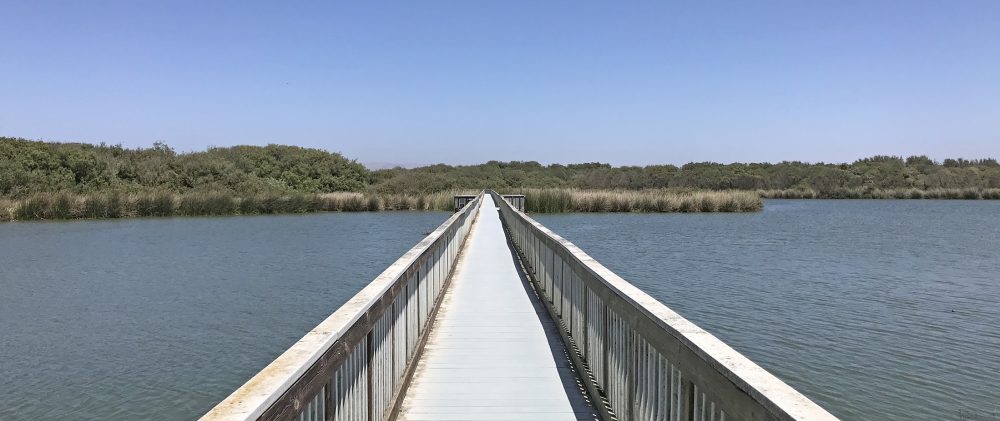
@sjsudon I truly enjoyed reading through your innovation roadmap. I love the attention you put into the participatory aspect of your idea, both in its implementation and in the planning of focused subject themes. I can tell that you gave this plan a lot of thought!
This sounds like a really fun idea! As a Filipino, I love how universities in the Philippines have done this already! Great work on the write-up. I think you show a lot of dedication!